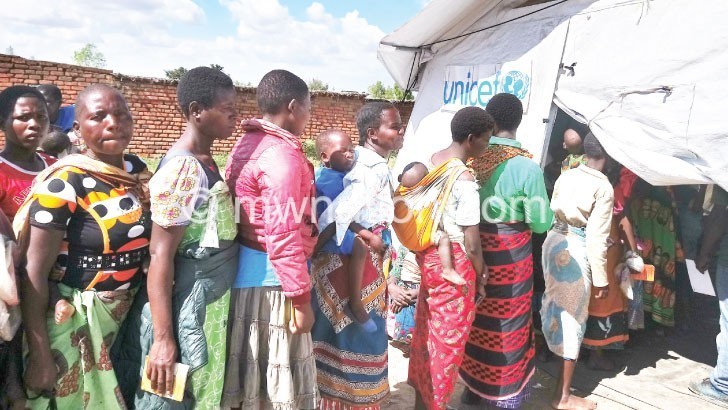Offering contraceptives when disaster strikes
We met Belita Tukulani Likhomo in a small village in Traditional Authority (T/A) Ngwelero, Zomba.
The 23-year-old is among 975 000 people affected by the March 2019 floods which severely affected the southern Malawi.
Soon after the floods devastated her village on March 8, the mother of two lost her home, property and the power to delay the next pregnancy.
She explained: “When the floods occurred, I was a month away to getting my contraceptive injection [Depo-Provera].

“However, Nantchengwa Primary School, where we sought refuge was far from Mayaka and Ngwelero health centres. Besides, the floods damaged all roads to the facilities.”
The disruption to Likhomo’s sexual and reproductive health mirrors the dilemma of many.
Kulinje Sailesi, 29, from T/A Chimwala in Mangochi, shares the sad tale of how the floods made it impossible for women to access family planning services. The mother of five almost lost it too because she could not afford transport to Ulongwe Health Centre, where she usually gets her contraceptives.
“My livelihood was disturbed. Although there is a private clinic that dispenses contraceptives near my village, I did not have the money to go there too,” she says.
This illustrates how natural disasters silently affect women and girls sexual and reproductive health.
According to the United Nations Population Fund (UNFPA), the floods affected 217 224 women and girls of reproductive age group in all 15 affected districts.
The UN agency projected that these flood survivors would deliver more than 7 000 children within three months.
Young people are particularly vulnerable to risky sexual encounters that lead to unwanted pregnancies and sexually transmitted infections, including HIV.
The flooding displaced nearly 90 000 people, who took shelter in 174 camps country wide.
The Post-Disaster Needs Assessment released in July shows women constituted 63 percent of those displaced in Mangochi, Machinga, Balaka and Zomba.
The report also shines a light on how the disaster disrupted healthcare services, with 1 841 kilometres of roads and 129 bridges destroyed. Some primary healthcare facilities remain cut off from district and central hospitals to which they refer critical patients.
To close the gaps in the affected communities, Malawi Red Cross Society (MRCS) partnered the Ministry of Health, with funding from the United Nations Children’s Fund (Unicef).
Between April and June, Red Cross, which works in emergency situation to lessen the suffering of people, conducted integrated mobile outreach clinics to provide vulnerable groups in Thyolo, Zomba, Balaka and Mangochi with essential health services.
The essential package included sexual and reproductive health care and family planning for adolescents as well as pregnant and breastfeeding women
Likhomo and Sailesi were among over 41 000 people who benefited from the 194 outreach clinics Red Cross and district health offices conducted in the four districts, including camps and surrounding villages.
Agness Adam, 19, who has a six-month-old baby in Sailesi Village says the outreach clinics gave her the opportunity to have her first contraceptive method.
“After giving birth, I did not have the capacity to go back to the health centre to get a family planning method of my choice. The mobile clinic came at the camp where I lived since March floods and gave me a chance to delay my next pregnancy instead of leaving it to fate,” she explains.
MRCS secretary general McBain Kanongodza says the society is happy that services that people were finding difficult to access, were actually at their finger tips when tragedy struck.
“This initiative to assist people to get close to health services has been commendable. We have managed to reach many people in the intended districts and we are happy about this,” he says.
Agness Kuluwangu, a senior community nurse midwife in Mangochi, says it was fascinating that women queuing for family planning services were also openly seeking advice on sexual and reproductive health issues. “Most women had sexual and reproductive health issues that had been pending for a long time. Due to the long distances to health centres and hospitals, they would rather sit at home without seeking a medical explanation,” she says.





